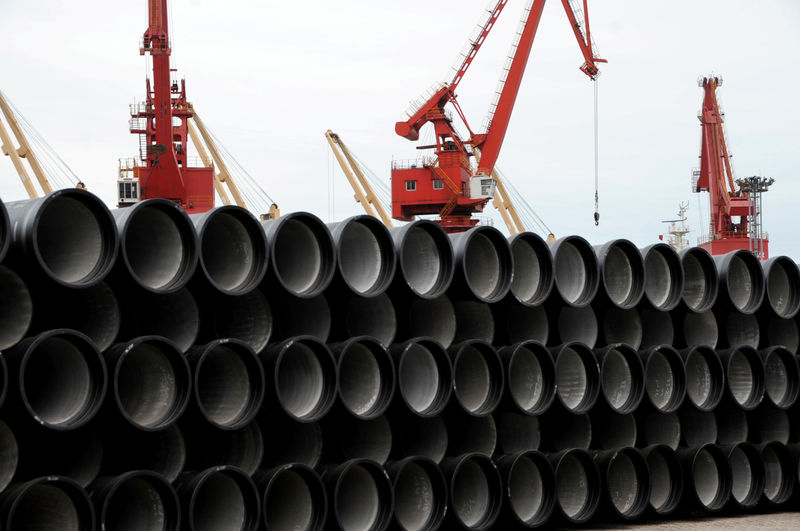(Adds details, market reaction)
By Dave Graham
MEXICO CITY, Aug 27 (Reuters) - Mexico's government said on Tuesday it had persuaded companies to waive "significant" profits from natural gas pipeline deals signed under the previous administration after renegotiating the contracts to save taxpayers $4.5 billion.
The deal announced by President Andres Manuel Lopez Obrador and the head of state-run power utility the Federal Electricity Commission (CFE) at a news conference will reduce what Mexico pays the firms to transport natural gas, the government said.
The months-long dispute has caused diplomatic frictions with Canada in particular, aggravating concerns that Lopez Obrador, a veteran leftist who took office in December, could call into question contracts signed before he assumed the presidency.
Flanked by Mexican industry leaders, including billionaire Carlos Slim, the country's richest man, Mexico's president championed the deal as a win for the public which would give certainty to investors and encourage growth.
"To be very clear, we won because the rates of gas transportation are being reduced," Lopez Obrador said, telling reporters that companies had agreed to sacrifice a "significant" chunk of the profits they would have made under the contracts.
"We also won," he added, because a dispute was averted that would have caused "an air of mistrust towards the government and towards Mexico at a time when investment is needed."
Mexico's main stock index .MXX rose by more than 1% after the deal was announced, mirroring gains in most other major Latin American markets. The peso currency MXN= initially firmed against the dollar but later slipped by more than 0.6%.
The government is still negotiating with one of the parties involved, Fermaca, a Mexican infrastructure company contracted to build two of the seven pipelines under dispute.
Supporters of Lopez Obrador hailed the accord as a political victory for the president, who has spent years accusing business leaders of colluding with corrupt politicians to get rich.
It is less clear, however, whether companies will feel encouraged to bet on Mexico as a result of the agreement.
"He's won the battle, but not the war," said one industry source familiar with the negotiations.
Lopez Obrador said the deal would bring savings to public coffers of $4.5 billion over time. A statement by the CFE later said that sum was the target, and that $3.74 billion had been saved under the results of negotiations to date.
The biggest pipeline under dispute was a $2.5 billion project between Texas and the Mexican Gulf Coast port of Tuxpan. Completed in June, it was built by Canada's TC Energy Corp and IEnova, a Mexican unit of U.S. company Sempra Energy (NYSE:SRE).
Shares in IEnova IENOVA.MX rose almost 7% at one point, while those of TC Energy TRP.TO traded up more than 1.2%.
Another pipeline was built by Grupo Carso, a firm controlled by Slim, who rarely makes public appearances.
CANCELED AIRPORT
Speaking at the news conference, Slim said he was pleased a deal had been reached, and highlighted the need to encourage private sector investment in Mexico. His presence there was a testament to the importance of the discussions.
Lopez Obrador triggered billions of dollars worth of losses on Mexican markets when he canceled a part-built $13 billion Mexico City airport, arguing it was tainted by corruption.
Slim, once the world's richest man, was one of the biggest investors in the airport project, and he was asked in the news conference whether he would like it to be revived.
"The future will tell us that," he said. "I don't know."
Lopez Obrador, in his remarks on Tuesday, said the original terms of the pipeline contracts were "harmful" to taxpayers, though Slim and Carlos Salazar, president of Mexican business lobby CCE, pushed back against questions from journalists suggesting the renegotiation was a rebuke of the private sector.
CFE head Manuel Bartlett said the $4.5 billion savings foreseen in the renegotiation should be viewed against a cost to the utility of $12 billion under the original contracts.
Miguel Reyes, a senior CFE official, said the extent of savings realized varied from one pipeline contract to another.
Seen across 25 years, the renegotiation meant a reduction of 28% on average in the transportation rates paid by the utility for all the pipelines included under the accord, Reyes said.
For his part, CCE's Salazar said the numbers were "complex", and that the total projected costs of services to the CFE over the lifetime of the contracts were some $21 billion.
